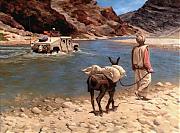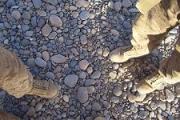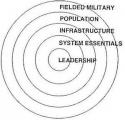Gen. Tommy Franks, who commanded U.S. forces when they entered Iraq more than three years ago, famously declared: "We don't do body counts." Franks was speaking in code. What he meant was this: The U.S. military has learned the lessons of Vietnam -- where body counts became a principal, and much derided, public measure of success -- and it has no intention of repeating that experience. Franks was not going to be one of those generals re-fighting the last war.
Unfortunately, Franks and other senior commanders had not so much learned from Vietnam as forgotten it. This disdain for counting bodies, especially those of Iraqi civilians killed in the course of U.S. operations, is among the reasons why U.S. forces find themselves in another quagmire. It's not that the United States has an aversion to all body counts. We tally every U.S. service member who falls in Iraq, and rightly so. But only in recent months have military leaders finally begun to count -- for internal use only -- some of the very large number of Iraqi noncombatants whom American bullets and bombs have killed.
Through the war's first three years, any Iraqi venturing too close to an American convoy or checkpoint was likely to come under fire. Thousands of these "escalation of force" episodes occurred. Now, Lt. Gen. Peter Chiarelli, the commander of U.S. ground forces in Iraq, has begun to recognize the hidden cost of such an approach. "People who were on the fence or supported us" in the past "have in fact decided to strike out against us," he recently acknowledged.
In the early days of the insurgency, some U.S. commanders appeared oblivious to the possibility that excessive force might produce a backlash. They counted on the iron fist to create an atmosphere conducive to good behavior. The idea was not to distinguish between "good" and "bad" Iraqis, but to induce compliance through intimidation.
"You have to understand the Arab mind," one company commander told the New York Times, displaying all the self-assurance of Douglas MacArthur discoursing on Orientals in 1945. "The only thing they understand is force -- force, pride and saving face." Far from representing the views of a few underlings, such notions penetrated into the upper echelons of the American command. In their book "Cobra II," Michael R. Gordon and Gen. Bernard E. Trainor offer this ugly comment from a senior officer: "The only thing these sand niggers understand is force and I'm about to introduce them to it."
Such crass language, redolent with racist, ethnocentric connotations, speaks volumes. These characterizations, like the use of "gooks" during the Vietnam War, dehumanize the Iraqis and in doing so tacitly permit the otherwise impermissible. Thus, Abu Ghraib and Haditha -- and too many regretted deaths, such as that of Nahiba Husayif Jassim.











 ). Would such a rewrite be "useful"? Probably, especially if he were to focus it on the development of training.
). Would such a rewrite be "useful"? Probably, especially if he were to focus it on the development of training.




Bookmarks